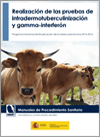Noticias de marzo de 2019
29 de marzo de 2019
Vía publiDB
Resistencia a antibióticos. Una amenaza global
Comunicación oral en Seminario Resistencia Antibióticos
28 de marzo de 2019
Feria de Madrid por la Ciencia y la Innovacion. Fundación para el conocimiento MADRI+D
VISAVET participó en este evento
28 de marzo de 2019
Vía publiDB
Scientific Conference on African Swine Fever
Comunicaciones en este evento:
- Diagnostic and Vaccines: the Role of Diagnosis in Control of ASF
- Control and Eradication of ASF in Different Epidemiological Scenarios
27 de marzo de 2019
Vía publiDB

Circulation of plasmids harboring resistance genes to quinolones and/or extended-spectrum cephalosporins in multiple Salmonella enterica serotypes from swine in the United States
Artículo de investigación publicado en Antimicrobial Agents and Chemotherapy
Nontyphoidal Salmonella enterica (NTS) poses a major public-health risk worldwide that is amplified by the existence of antimicrobial resistant strains, especially to quinolones and extended-spectrum cephalosporins (ESC). Little is known on the dissemination of plasmids harboring the acquired genetic determinants that confer resistance to these antimicrobials across NTS serotypes from livestock in the United States.NTS isolates (n=183) from U.S. swine clinical cases retrieved during 2014-2016 were selected for sequencing based on their phenotypic resistance to enrofloxacin (quinolone) or cefti…
Leer más
27 de marzo de 2019
Vía ucm.es
La Universidad Complutense despliega su potencial divulgativo en la Feria de Madrid por la Ciencia y la Innovación
La UCM en la Feria de Madrid por la Ciencia y la Innovación
26 de marzo de 2019
Vía publiDB
Scientific Conference on African Swine Fever
Comunicaciones en este evento:
- Diagnostics and vaccines: The role of diagnosis in the control of ASF
21 de marzo de 2019
Vía publiDB

Urgencias, emergencias y medicina humanitaria
Comunicación oral en II Congreso de estudiantes de medicina y ciencias biomédicas
20 de marzo de 2019
Vía alacarta.aragontelevision.es
Amenaza de bacterias y antibióticos ineficaces
Antibióticos ineficaces
19 de marzo de 2019
Vía publiDB
Demasiados antibióticos
Entrevista concedida a Millenium RTVE. Millenium RTVE
18 de marzo de 2019
Vía publiDB
RAM en el contexto de una salud
Comunicación oral en Curso avanzado sobre Resistencia a Antimicrobianos en la cadena agroalimentaria
16 de marzo de 2019
Vía publiDB
Zaragoza, sede del debate científico sobre el reto de las superbacterias
Entrevista concedida a El Heraldo. El Heraldo
13 de marzo de 2019
Vía publiDB
Mesa redonda: Herramientas de control en la Peste Porcina Africana
Comunicación oral en XI FORO ANVEPI
7 de marzo de 2019
Vía publiDB
Jornada sobre la tuberculosis caprina
Comunicaciones en este evento:
- Interferencias diagnósticas en la tuberculosis. Estudios de sensibilidad y especificidad
- Diagnóstico Anatomopatológico de la Tuberculosis Caprina
4 de marzo de 2019
Vía publiDB
Immune related genes as markers for monitoring health status of honey bee colonies
Investigación publicada en BMC Veterinary Research
Background
Honey bee population decline threatens the beekeeping sector, agriculture and global biodiversity. Early detection of colony mortality may facilitate rapid interventions to contain and prevent mortality spread. Among others, deformed wing virus (DWV) is capable of inducing colony losses, especially when combined with Varroa destructor mite. Since the bee immune system plays a crucial role in ensuring that bees are able to face these pathogens, we explored whether expression of immune genes could serve as biomarkers of colony health.
Results
Herein, we describe a preliminary immun…
Leer más
4 de marzo de 2019
Vía publiDB

Validation of a Real-Time PCR for the Detection of Mycobacterium tuberculosis Complex Members in Bovine Tissue Samples
Artículo de investigación publicado en Frontiers in veterinary science
Although the post-mortem diagnosis of bovine tuberculosis is mainly achieved through microbiological culture, the development of other techniques to detect Mycobacterium tuberculosis complex (MTBC) members directly from tissue samples has been pursued. The present study describes the development, optimization and validation of a Real-Time PCR based on the mpb70 gene to detect MTBC members in clinical tissue samples from cattle. Specific primers and a hybridization probe were used to amplify MTBC-specific sequences in order to avoid cross-reaction with non-MTBC species. An Internal Amplificatio…
Leer más
1 de marzo de 2019
Vía publiDB
Specificity of serological test for detection of tuberculosis in cattle, goats, sheep and pigs under different epidemiological situations
BMC Veterinary Research publica este artículo de investigación
BACKGROUND:
Serum antibody detection has potential as a complementary diagnostic tool in animal tuberculosis (TB) control, particularly in multi-host systems. The objective of the present study was to assess the specificity (Sp) of an enzyme-linked immunosorbent assay (ELISA) based on the new multiprotein complex P22 for the detection of specific antibodies against the Mycobacterium tuberculosis complex (MTC) in the four most relevant domestic animals acting as MTC hosts: cattle, goat, sheep and pig. We used sera from an officially TB-free (OTF) country, Norway, and from a non-OTF one, Spain.…
Leer más
1 de marzo de 2019
Vía publiDB
Day-old chicks are a source of antimicrobial resistant bacteria for laying hen farms
Investigación publicada en Veterinary Microbiology
Antimicrobial resistant bacteria are rarely detected in laying hens and the objective of this longitudinal study was to test day-old chick as a source. Four different commercial batches raised on the same farm were monitored from day-old chick to laying hens using Escherichia coli as a model. Ten colonies from each of the eight samplings per batch were tested for antimicrobial susceptibility using 14 antimicrobials.
Overall (313 isolates), higher resistance percentages were detected for tetracycline (26.8%), followed by sulphonamides (16.3%), ampicillin (16.0 %) and quinolones (10.9% and 9.3%…
Leer más
1 de marzo de 2019
Vía publiDB

Manual de procedimiento para la realización de las pruebas de intradermotuberculinización y gamma-interferón. 2019-2020
Edita este ejemplar: Ministerio de Agricultura, Pesca y Alimentación (MAPA) y Centro de Vigilancia Sanitaria Veterinaria (VISAVET). UCM.
La tuberculosis bovina es una enfermedad de declaración obligatoria en España que ya estaba contemplada como tal en la Ley de Epizootias de 1952, y actualmente, tomando como normativa básica la Ley 8/2003, de Sanidad Animal, por el Real Decreto 526/2014, por el que se establece la lista de enfermedades de animales de declaración obligatoria y se da la normativa para su notificación.
Los Programas Nacionales de Erradicación frente a esta enfermedad comenzaron a aplicarse sistemáticamente en los años 90, centrados fundamentalmente en el vacuno lechero para posteriormente extenderse al ganado …
Leer más


